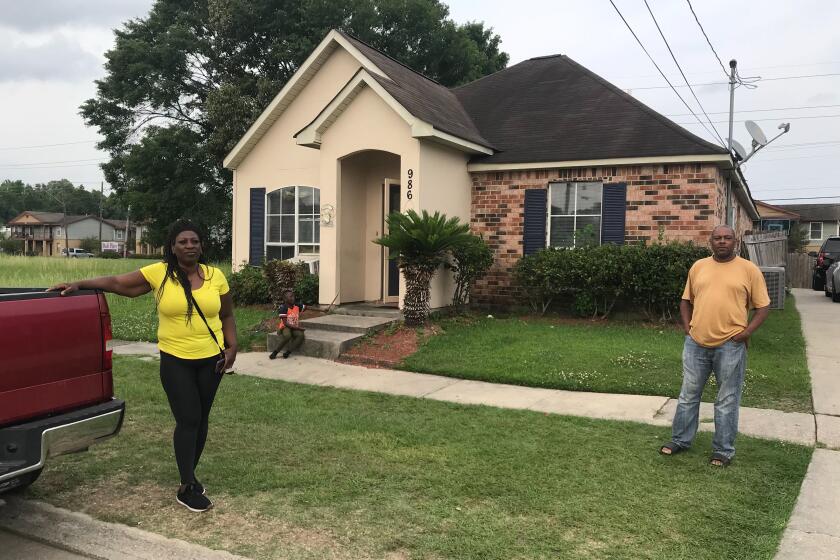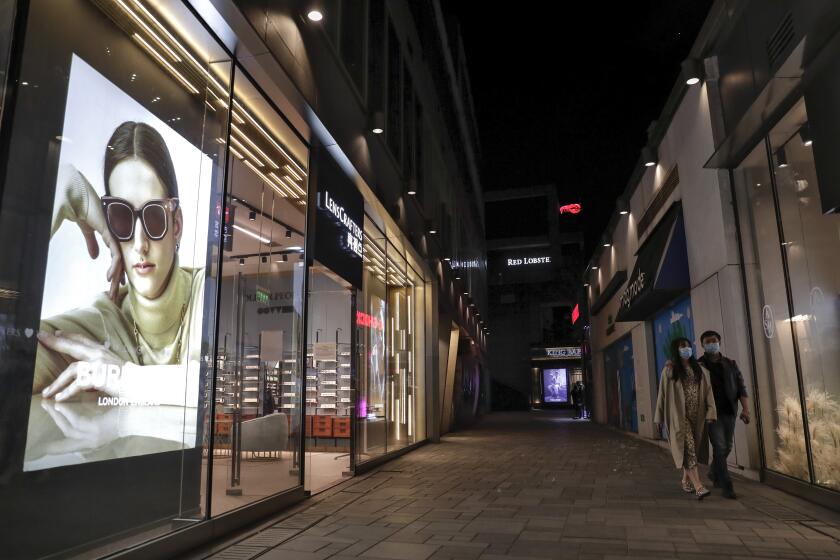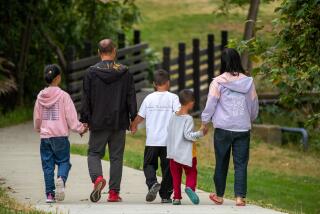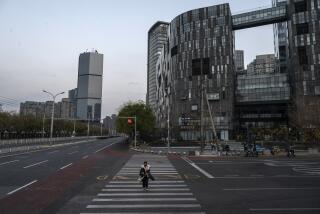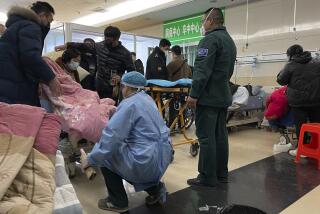‘No blacks’: Evicted, harassed and targeted in China for their race amid coronavirus
- Share via
BEIJING — Elo started cooking as soon as he heard about the boys on the street. The Nigerian trader opened an informal restaurant in Foshan, a manufacturing city half an hour’s train ride from Guangzhou, where dozens of Africans became homeless last week.
Evictions from homes and apartments started when Guangzhou authorities announced that five Nigerians had tested positive for COVID-19. Within days, a campaign was launched to test and track all Africans in the port city.
The sudden and sweeping move was consistent with China’s response to the coronavirus. But it was propelled by a troubling logic that targeted people based on race rather than their contact history. The measure ignited a diplomatic outcry and a crisis on Guangzhou’s streets.
Some of the displaced Africans were longtime residents forced from their homes. Others were businessmen who’d completed 14-day quarantines, but then couldn’t find any hotels that would accept them.
They roamed the streets in the rain and slept under highway overpasses, huddled on the pavement in face masks. They filmed videos of police shouting at them, pressing young men to a wall, and of signs posted in apartment buildings and restaurants — including McDonald’s — saying: “No blacks.”

“I saw a lot of videos, boys hanging outside, they were hungry… I just have to support, to see the people eat food,” Elo, 36, said. He made big batches of moi moi, a Nigerian steamed bean cake, and asked a Chinese friend to deliver them to Guangzhou, afraid that he’d be targeted if he went out.
Then his landlord called.
The police were concerned that a black man was living in the building. Elo had sublet the apartment from a Chinese friend and paid every month’s rent in advance. But the police informed the landlord that the Chinese friend needed to be quarantined, allegedly because he’d been in contact with an infected person. Elo had to leave his home.
“The next day, they [turned] off my water,” Elo said. That was last Tuesday. He spoke in multiple interviews this week from a hotel in Foshan, where he is now under quarantine after having tested negative for the coronavirus. Like several other foreigners interviewed for this story, he asked to withhold his full name for protection from Chinese authorities.
Three months into China’s coronavirus crisis, domestic infections have slowed dramatically. Schools are reopening in coming weeks. Many shops and restaurants are open, and masked workers have returned to their offices.
But the “war” against coronavirus has continued with a new target: imported cases, which are reported by the dozens each day. As of Wednesday, 1,500 of 1,968 current confirmed cases in China are imported. Most are Chinese nationals coming home from abroad, not foreigners, who have been banned from entry since March 28.
Yet fear of a COVID-19 resurgence has heightened xenophobia and vigilance against foreigners, spurred by state media portrayals of China as responsible and victorious over the virus while the outside world is engulfed in coronavirus-driven chaos.
China’s actions are coming at a sensitive time as African nations seek debt relief due to the pandemic, especially from China, one of Africa’s largest lenders and the country where the coronavirus outbreak began. Beijing has invested more than $300 billion in sub-Saharan Africa since 2005, much of it in of ports, railways and other infrastructure projects as part of the controversial Belt and Road Initiative.
Many indebted African countries’ diplomats have supported Beijing on political issues such as China’s Uighur concentration camps, Hong Kong protests, and the WHO’s rejection of Taiwanese membership. WHO chief Tedros Adhanom Ghebreyesus recently accused Taiwan of making racist attacks against him, a claim that Chinese state media broadcast widely.
But it is China’s domestic treatment of Africans that is now raising calls for a rethink of China-Africa relations in Nigeria, Kenya and other debtor countries.
Africans have been targeted especially after local media reports about a Nigerian man who allegedly assaulted a nurse while resisting quarantine at a hospital. A picture of the injured nurse went viral on Chinese social media, garnering tens of thousands of furious comments and calls for Africans to be deported.
Many of the comments compared black people to animals and calling for preservation of Chinese “purity” by preventing intermarriage between black and Chinese people. They called Africans “sanfei,” a derogatory term meaning “three illegals” — that is, illegal entry, residence, and work — implying that they were all undocumented migrants.
In Illinois, Louisiana and Michigan, African Americans are dying at higher rates than whites from coronavirus.
Local authorities announced Tuesday that they had tested 4,553 Africans for the coronavirus since April 4, and that 111 had been found positive, including 19 imported cases.
Several Africans who spoke with The Times said they supported China’s coronavirus control measures and were willing to be tested and quarantined. But they felt hurt by evictions, police harassment, and treatment as if they were criminals.
Jason, a Nigerian trader who was also evicted from his home, described how police had recently chased a group of roughly 50 displaced Africans through the streets: “We are many that night. Because we don’t have a house. So if they see us in the street, they push us and say to go! Go where? We say, we don’t have house. … Some people don’t have hotel. They’re done with quarantine but not allowed to enter hotels again. So we walk on the road.”
Kevin, 29, a student from Burundi who’s been in Guangzhou for five years, said he’d never felt discrimination until last week, when his entire dormitory building, which houses many African students, was put in forced quarantine — despite all of them testing negative for COVID-19. He’d also seen the videos of Africans on the streets.
“Imagine you see someone like your dad or your mom sleeping outside under the bridge in the cold weather and the rain,” he said. “They hurt us bad. … I felt like, please, I want to go back home now. It was my first time to have that feeling.”
Guangzhou authorities have launched eviction campaigns against the African community in the past, said Guangzhi Huang, a professor at the Massachusetts College of Liberal Arts who has researched policing of Africans in Guangzhou.
“They’ve been slowly gentrifying the area, kicking out the African residents,” Huang said. He compared eviction of Africans to similar drives against rural migrants, another population that city authorities have associated with crime and called “low-quality” people.
But this campaign extended beyond Africans to anyone who is black.
Matthew Scott, a white American from New Jersey who owns a pizza restaurant in Guangzhou, said his staff had received calls from the district-level local government, telling them to forbid foreigners from eating in restaurants, “especially black people.” Scott told his staff to ignore the orders.
“If I ran an American restaurant in the U.S., there’s no chance I’d ever not allow Chinese people in my restaurant,” he said. “I told them, in February we didn’t discriminate against Chinese people. In April, we won’t discriminate against black people.”
Two representatives of Black Livity China, an online collective that documents black people’s experiences in China, confirmed that the evictions and forced quarantines had affected Africans, black Americans, and black Caribbean people in Guangzhou, including at least one pregnant woman whom they were personally assisting.
“She is not undocumented. She has a young child, and is heavily pregnant. Her mental health has been severely impacted by this ordeal but she is staying strong,” they wrote in an email to The Times. They did not disclose their names or the woman’s name for protection.
“I’m living in fear,” said Shelly, a black American from Texas living in Shenzhen with her African husband and 2-year-old son. Medical workers came to her home to test her husband, a goods trader, because of his nationality, she said. He was negative, and they weren’t forced to quarantine. But she constantly feared that what happened in Guangzhou might repeat in other cities.
“I don’t want to take my son outside because I don’t like the dirty looks,” she said. “I do want to stay in China and live here, but this has been something I’ve never experienced in my life.”
On April 11, the U.S. Consulate General in Guangzhou sent a health alert to Americans in China, stating that black Americans should “avoid the Guangzhou metropolitan area until further notice” because of discrimination against people who “appear to be of African origin.”
Over the weekend, diplomats from Nigeria, Ghana, South Africa, Uganda and the African Union also demanded publicly that China address its mistreatment of Africans. A video of Nigeria’s speaker for the house of representatives confronting the Chinese ambassador went viral on Twitter. Ghana’s foreign minister summoned the Chinese envoy and complained of “inhumane treatment.”
Chinese diplomats have denied that there is discrimination against Africans, accusing the United States of “exaggerating this issue” to “sow discord” between China and Africa.
“We reject differential treatment, and we have zero tolerance for discrimination,” said Ministry of Foreign Affairs spokesman Zhao Lijian in a statement issued April 12. He said Guangdong authorities were “working promptly to improve their working methods,” without acknowledging or apologizing for how Africans had been treated.
Since then, most of the evicted Africans have been placed in hotels for quarantine. State media have also broadcast news videos of Chinese workers offering flowers and food to quarantined Africans, who thank them and say they are “very comfortable.”
Several volunteer groups of both foreigners and Chinese are providing financial support, sending food and locating apartments for the evicted Africans, many of whom have been out of work for months. But the Chinese volunteers have been criticized online and reported to the police for “encouraging contact with potentially infected people.”
Chinese leaders have reopened factories and shops, but consumers have been slow to return to malls and car dealerships.
Elo, who asked his friends to “pray for China” when the virus broke out in Wuhan, has recently been refused taxi rides. Children stare at him on the street “like they’re seeing a monster.” Passersby mock him, calling him dirty names that he understands after living in China for four years.
It was ironic to lock people up against their will at their own expense, then demand their thanks, he said. “If I’m on the street working in my office, I can afford my bills. I don’t need to depend on anybody. … What’s the sense of me telling you thank you?”
Nigerians are now discussing an evacuation flight from China. Elo said he’d take it if possible.
“Even if you don’t have work back home, you have your respect. At least you can protect your dignity,” he said. “Maybe it’s better for me, starting a new life.”
More to Read
Sign up for Essential California
The most important California stories and recommendations in your inbox every morning.
You may occasionally receive promotional content from the Los Angeles Times.
